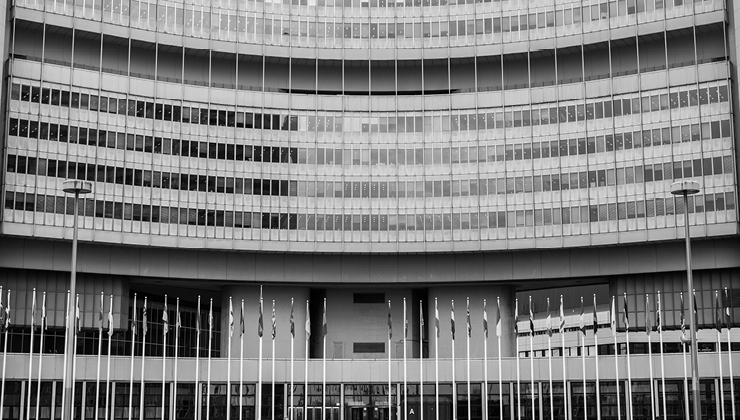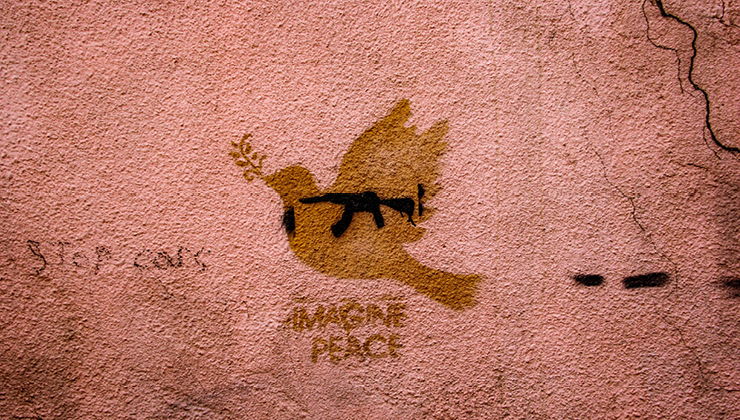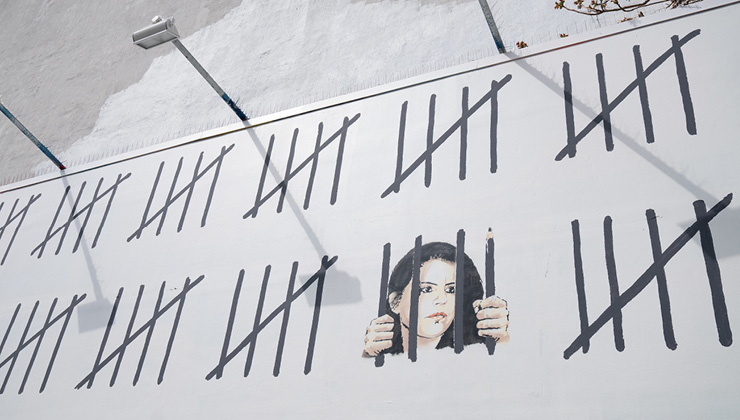Bela Kapur brings us some reflections from women peacebuilders around the world, looking at how a feminist lens and feminist leadership practices can bring justice, equality and freedom to all communities as we protest against power structures, discrimination and the exclusion of marginalised communities around the world.
America is in pain.
We are seeing – again – what happens when injustice prevails.
We are seeing the result of grievances emanating from structural racism that have been simmering and stewing, neglected and shunted aside for centuries.
We are seeing what happens when a part of the community, the African-American community, is not able to exercise its rights and live in true freedom with equal opportunity and dignity.
We are seeing what happens when lives are not equally valued, when there is a hierarchy of lives.
For the past two weeks, we have seen hundreds of thousands of Americans of different races and religions protest together demanding justice, equality and freedom. We have seen continuing protests – both in solidarity with American activists as well as inspired by these demands to protest against their own systemic racism in cities across the world.
Women living in conflicts across the globe from Burundi, Syria to Ukraine are fighting for the same rights – for justice, equality and freedom. And at the same time, these women are building peace in their communities and nations.
These peacebuilders embody what feminist leadership in action means in our world today. The attributes of feminist leadership embodied and practiced by many women peacebuilders have relevance beyond what we understand to be the space and context of violent or armed conflict.
Indeed, President Trump might like to jot down a few notes from the experience of women peacebuilders. It could yet help him out of the ditch he has dug for himself.
Feminist leadership sees the world through an, unsurprisingly, feminist lens. This lens helps us to see and analyse structures, systems and institutions which incorporate or lead to the marginalisation, discrimination or exclusion of people. The same lens then helps us to craft responses to this marginalisation, discrimination and exclusion.
These responses must necessarily be intersectional in order to consciously take into account the diversity of identities that a person holds because these identities impact how we are able – or not – to exercise our rights and the choices and opportunities before us. These identities certainly include race and gender, but they are much broader and deeper than race and gender alone.
Our identities encompass, for instance, class, age, disability, sexual orientation, level and type of education, whether people are rural or urban dwellers, and whether they are migrants, refugees or part of the host community, and so on. These responses – be they strategies, policies, or programmatic support – must explicitly tackle those structures, systems and institutions and deliver justice, equality and freedom for all and the re-building of society – and the rebuilding of communities – without marginalisation, discrimination, or exclusion.
These responses must necessarily be intersectional in order to consciously take into account the diversity of identities that a person holds because these identities impact how we are able - or not - to exercise our rights and the choices and opportunities before us
In reality, when we put on our feminist lens, we are taking about bringing about political, economic, social, cultural, and even psychic transformation of the individual, of the community and of society. This means we are also ultimately talking about the re-distribution of power and responsibilities.
And, more than anything, the feminist lens places the human at the centre of analysis and decision-making.
Such an approach inevitably means that both women and men can practice feminist leadership.
So now we know what it is, how do we practice feminist leadership?
Having closely worked with, listened to and observed women peacebuilders from across the globe for a number of years, it is clear to me that notwithstanding the difference in the contexts of, for instance, Burundi, Cyprus, and Libya, there are a number of common attributes and practices underpinning feminist leadership. Some of these attributes are certainly found in other leadership types. Yet it is the concentration and prevalence of these attributes and their underlying practices together with the shared objective to transform power structures, dynamics and relations that makes these leadership attributes feminist in nature and execution.
I would suggest that there are 10 attributes of feminist leadership practised by many women peacebuilders across the globe that President Trump may consider taking on board.
First, self-awareness. By self-awareness, I mean to suggest an awareness of the power you hold and wield, an awareness of your privileges and where that places you and where it places others vis-à-vis you, as well as an awareness of your unconscious biases. Self-awareness, however, is not enough. Once aware, it demands constant vigilance to share -and even give up – your power, assets and resources.
Second, in service to others. When South Sudanese women encourage the young men of their communities not to take up arms, they do so because of a sense of service and commitment to their communities and nation. In general, it seems to me that women’s peacebuilding work is not driven by a desire for self-advancement but by a commitment to advance the lives of their communities.
Third, courage. Courage does not just mean the ability to stand up to power even when there is risk to you, as Syrian women are doing when they negotiate cease fires with armed groups. Many women peacebuilders demonstrate inordinate courage by being open and bringing in people with different views – often those on the other side of the conflict. Sure, this openness can lead to challenge at the individual and group level but it can also lead to identifying new approaches to complex problems.
Fourth, humility. Women living in Burundi’s capital, Bujumbura, are clear on what humility means to them: it’s about knowing the extent of your own knowledge and capacities and at the same time knowing that others – usually those closer to the ground often living at the periphery – will know more. Such knowledge helps to craft your role – which often means supporting and not being centre-stage. Humility also enables you to acknowledge privately and publicly when you make mistakes.
Fifth, empathy. Definitions of empathy abound. Perhaps the most striking proposed by an Iraqi peacebuilder is the most simple: to act towards another as a human being. This means reaching out, listening fully, being afraid to, and yet, talking about your own fears and challenges, and making relational and not transactional connections.
Sixth, curiosity and learning. The women peacebuilders with whom I have worked are deeply curious and committed to learning. For many Azerbaijani women peacebuilders, this curiosity drives efforts to better understand both ‘the Other’ – in this context women living in Armenia and Nagorno-Karabakh – as well as women of their own community and particularly the lives of younger women.
Seventh, persistence. Some women peacebuilders are living through decades-old conflicts. The ‘silent’ conflict in Cyprus has been ongoing since 1974 – more than 45 years! And yet, these peacebuilders do not give up in the face of continuing belittling and hostilities to their peacebuilding efforts – from even within their own communities. Instead, they practice persistent patience both as they seek to build understanding and find common ground with ‘the Other’ and as they lobby their own communities for greater openness and commitment to resolve the conflict.
Eighth, task-based hierarchy. Armenian women peacebuilders seeking to resolve the conflict over the disputed Nagorno-Karabakh region speak of task-based hierarchy. This recognises that there is a relationship between tasks, and some are more pressing than others. However, this hierarchy should not impact relations or devalue contributions. And people should be seen, recognised and included for who they are – for their personal power – and not for their titles, positions or formal power.
Ninth, accountability. Women peacebuilders across the globe recognise the centrality of accountability as they lead. This begins first with being accountable to yourself so that you show up with integrity and commitment to your values. It also means being accountable to the people you are serving – are you delivering on what you have agreed with them?
And, finally, confidence. South Sudanese women peacebuilders manifest a deep confidence in themselves, their mission, and the people they are serving. Some women, too, are supported by a deep confidence in their faith. But more than anything, these women believe in and trust the wisdom of their people.
These attributes and practices of feminist leadership underpin many women peacebuilders efforts to resolve conflict and build peace in ways that impact their communities’ lives everyday.
Feminist leadership practices raise all of us up to live lives of dignity, value and liberty.
So, at this perilous – yet hopeful? – moment in America’s history, will President Trump continue to be the disrupter he has been and this time take on board the lens, attributes and practices of feminist leadership to bring about a more perfect Union?”
The views, thoughts and opinions expressed in this blog post are those of the author(s) only, and do not necessarily reflect LSE’s or those of the LSE Centre for Women, Peace and Security.
Image credit: Clay Banks





